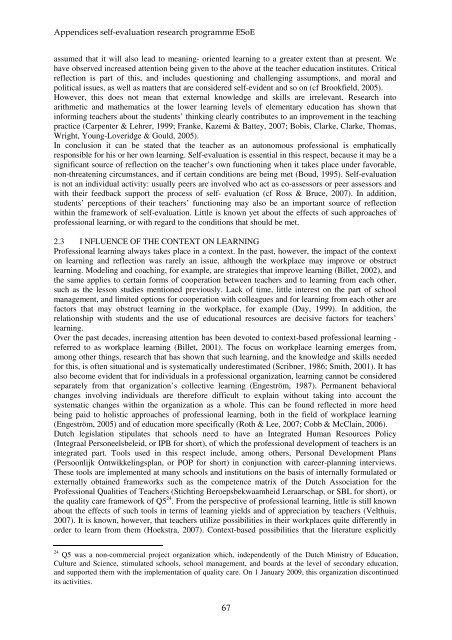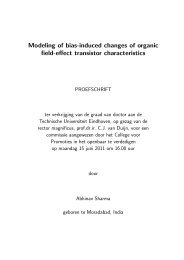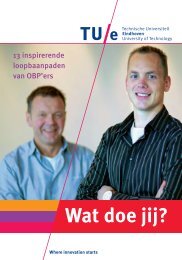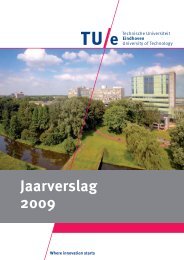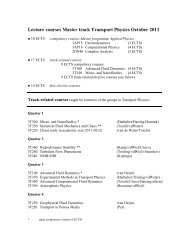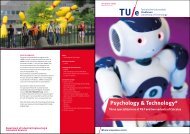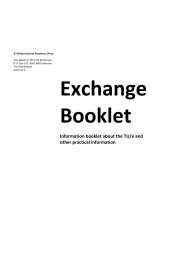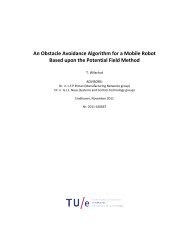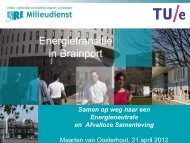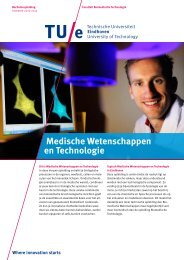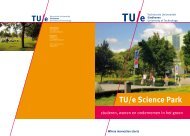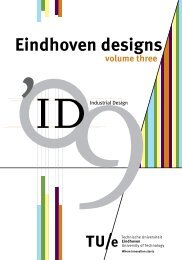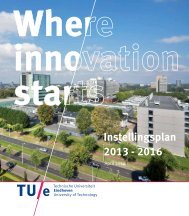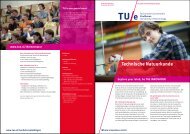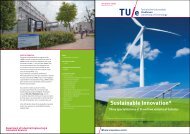Self-evaluation - Technische Universiteit Eindhoven
Self-evaluation - Technische Universiteit Eindhoven
Self-evaluation - Technische Universiteit Eindhoven
You also want an ePaper? Increase the reach of your titles
YUMPU automatically turns print PDFs into web optimized ePapers that Google loves.
Appendices self-<strong>evaluation</strong> research programme ESoE<br />
assumed that it will also lead to meaning- oriented learning to a greater extent than at present. We<br />
have observed increased attention being given to the above at the teacher education institutes. Critical<br />
reflection is part of this, and includes questioning and challenging assumptions, and moral and<br />
political issues, as well as matters that are considered self-evident and so on (cf Brookfield, 2005).<br />
However, this does not mean that external knowledge and skills are irrelevant. Research into<br />
arithmetic and mathematics at the lower learning levels of elementary education has shown that<br />
informing teachers about the students’ thinking clearly contributes to an improvement in the teaching<br />
practice (Carpenter & Lehrer, 1999; Franke, Kazemi & Battey, 2007; Bobis, Clarke, Clarke, Thomas,<br />
Wright, Young-Loveridge & Gould, 2005).<br />
In conclusion it can be stated that the teacher as an autonomous professional is emphatically<br />
responsible for his or her own learning. <strong>Self</strong>-<strong>evaluation</strong> is essential in this respect, because it may be a<br />
significant source of reflection on the teacher’s own functioning when it takes place under favorable,<br />
non-threatening circumstances, and if certain conditions are being met (Boud, 1995). <strong>Self</strong>-<strong>evaluation</strong><br />
is not an individual activity: usually peers are involved who act as co-assessors or peer assessors and<br />
with their feedback support the process of self- <strong>evaluation</strong> (cf Ross & Bruce, 2007). In addition,<br />
students’ perceptions of their teachers’ functioning may also be an important source of reflection<br />
within the framework of self-<strong>evaluation</strong>. Little is known yet about the effects of such approaches of<br />
professional learning, or with regard to the conditions that should be met.<br />
2.3 I NFLUENCE OF THE CONTEXT ON LEARNING<br />
Professional learning always takes place in a context. In the past, however, the impact of the context<br />
on learning and reflection was rarely an issue, although the workplace may improve or obstruct<br />
learning. Modeling and coaching, for example, are strategies that improve learning (Billet, 2002), and<br />
the same applies to certain forms of cooperation between teachers and to learning from each other,<br />
such as the lesson studies mentioned previously. Lack of time, little interest on the part of school<br />
management, and limited options for cooperation with colleagues and for learning from each other are<br />
factors that may obstruct learning in the workplace, for example (Day, 1999). In addition, the<br />
relationship with students and the use of educational resources are decisive factors for teachers’<br />
learning.<br />
Over the past decades, increasing attention has been devoted to context-based professional learning -<br />
referred to as workplace learning (Billet, 2001). The focus on workplace learning emerges from,<br />
among other things, research that has shown that such learning, and the knowledge and skills needed<br />
for this, is often situational and is systematically underestimated (Scribner, 1986; Smith, 2001). It has<br />
also become evident that for individuals in a professional organization, learning cannot be considered<br />
separately from that organization’s collective learning (Engeström, 1987). Permanent behavioral<br />
changes involving individuals are therefore difficult to explain without taking into account the<br />
systematic changes within the organization as a whole. This can be found reflected in more heed<br />
being paid to holistic approaches of professional learning, both in the field of workplace learning<br />
(Engeström, 2005) and of education more specifically (Roth & Lee, 2007; Cobb & McClain, 2006).<br />
Dutch legislation stipulates that schools need to have an Integrated Human Resources Policy<br />
(Integraal Personeelsbeleid, or IPB for short), of which the professional development of teachers is an<br />
integrated part. Tools used in this respect include, among others, Personal Development Plans<br />
(Persoonlijk Ontwikkelingsplan, or POP for short) in conjunction with career-planning interviews.<br />
These tools are implemented at many schools and institutions on the basis of internally formulated or<br />
externally obtained frameworks such as the competence matrix of the Dutch Association for the<br />
Professional Qualities of Teachers (Stichting Beroepsbekwaamheid Leraarschap, or SBL for short), or<br />
the quality care framework of Q5 24 . From the perspective of professional learning, little is still known<br />
about the effects of such tools in terms of learning yields and of appreciation by teachers (Velthuis,<br />
2007). It is known, however, that teachers utilize possibilities in their workplaces quite differently in<br />
order to learn from them (Hoekstra, 2007). Context-based possibilities that the literature explicitly<br />
24 Q5 was a non-commercial project organization which, independently of the Dutch Ministry of Education,<br />
Culture and Science, stimulated schools, school management, and boards at the level of secondary education,<br />
and supported them with the implementation of quality care. On 1 January 2009, this organization discontinued<br />
its activities.<br />
67


